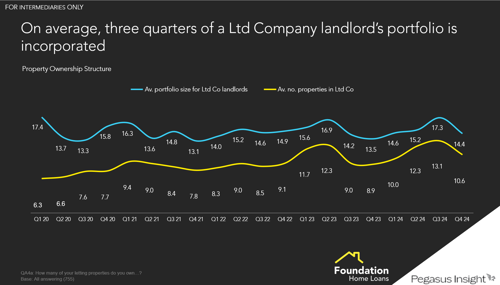Your Business and Industry
Why going limited is becoming the smart move for landlords
The UK's buy to let market is shifting significantly, with more landlords choosing to incorporate. According to the Pegasus Insight Landlord Trends report for Q4 2024, limited company ownership is becoming the preferred choice for professional landlords, offering brokers a key opportunity to engage in strategic conversations

The report highlights that 22% of landlords own at least one property within a limited company, with 9% holding their entire portfolio this way.
Notably, landlords who operate within a limited company tend to have larger portfolios, averaging 10.6 properties. Additionally, the percentage of properties held in a limited company has doubled from 36% in Q1 2020 to 74% in Q4 2024. This surge is driven by landlords almost exclusively purchasing new properties within a business structure, demonstrating the long-term shift toward incorporation.

Why are landlords choosing this route?
Insights from the NRLA survey reveal that landlords are incorporating primarily due to:
- Tax benefits – Corporation tax advantages and mortgage interest relief.
- Portfolio structuring – More flexibility in succession and long-term financial planning.
However, some landlords remain cautious due to the complexity and perceived costs of incorporation, alongside concerns about Capital Gains Tax implications when transferring properties.
What this means for our intermediary partners
The growing preference for limited company structures is reshaping BTL demand. Nearly 70% of landlords plan to purchase their next property within a limited company. In comparison, portfolio landlords (4+ BTL mortgages) are significantly more likely to refinance in a limited company compared to consumer landlords (22% vs. 10%).
Given the growing trend of professional landlords operating within a limited company framework, brokers have a golden opportunity to provide expert guidance and access to specialist mortgage solutions tailored to landlords' specific needs and long-term investment strategies. Additionally, as tax and regulatory pressures prompt landlords to reassess their financial structures, brokers can be crucial in supporting refinancing strategies that optimise portfolios and ensure long-term sustainability.
By staying ahead of regulatory developments and understanding the evolving landscape of the private rented sector, brokers can position themselves as trusted advisers, helping more landlords to navigate complexities and seize opportunities in an ever-changing market.
For intermediaries only



